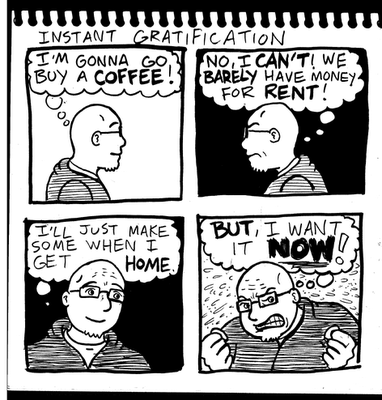Pizza Hut now? Or six-pack abs later? Get this question right, and you might just win at the game of life too.
What did you eat for dinner last night? Why?
I had pizza. I made it at home with a corn meal crust, tomato sauce, mushrooms, spinach, artichokes and olives.
After eating, I didn’t immediately go over to the bathroom mirror and see if I was leaner. There wasn’t an immediate result in the physique department.
I could’ve ordered the fat man special from Pizza Hut loaded with crappy ingredients. It probably would have been easier and provided more immediate stimulation/reward.
And if I went to the bathroom mirror after eating it, I wouldn’t have instantly gained bodyfat. Ha ha! I sure sneaked that one past my body! Sucker!
Getting your Sudoku fix

Do you know any addicts… errr… I mean…people that play Sudoku? It’s a number puzzle.
You spend time struggling to establish the answer. Finally, you figure it out and get a little reward of “I did it.”
This reward can help to continue the cycle of playing and conquering Sudoku.
But what if someone hands you a 500 page stack of Sudoku puzzles to complete?
You might start, but soon become overwhelmed with the amount to solve. Months or years will pass before any dent will be made. The little immediate reward is lost in the volume of the task.
Isn’t this how most of us approach our eating and exercise?
We set out to lose 50 pounds of fat and maintain it for life. We’re talking decades of healthy eating and exercise habits. That’s daunting. The little immediate reward we get along the way is lost in the volume of the task.
Most of our reward systems are measured with a stopwatch, not a calendar. Pizza Hut and alcohol are NOW rewards. We don’t order the pizza and beer expecting to experience the enjoyment in 40 days. Pleasure systems are now or never.
Me like immediate!
Humans like immediate. Immediate makes sense to us.
If I’m bent over and I stand up, only to bang my head on a cabinet – the pain is immediate. I’m pretty sure the cabinet caused the pain.
If I hit my head but it didn’t hurt for 15 days, I wouldn’t be so sure what caused the pain.
The more time that passes after a behavior, the greater chance there are other potential explanations.
We don’t get many immediate rewards for eating healthy each day. Most of us continue moving forward because we feel like it’s the right thing to do. When it comes to how we look, there is no instantly measurable outcome.
Is it worth it?
Back in junior high, I used to always complain about my science homework. I thought that knowing chemistry was insignificant to my future.
The day I defended my thesis, I was pretty happy that my parents made me study my junior high science homework.
But don’t many of us complain that eating vegetables is insignificant to our body?
To pursue a new way of eating, we must feel the new way is worth pursuing BEFORE we have verification.
We don’t get a tight waistline after one day of eating healthy. We have to trust in our methods.
Moving forward merely based on “trust” is tough and this way of living doesn’t hold a high priority for us. But we must do this to succeed. We have to move forward with only a sense of the vegetables’ long-term value.
The process doesn’t always make sense at the time (like my junior high science homework). But the long-term payoff is worth it.
Long-term projects
Consider what propels you in a long-term project (e.g., writing a book, a thesis, maintaining a fit body, building a relationship, learning an instrument, etc).
With long-term projects, sooner or later, we need some personal conviction that we’re making progress. Without some practical value of the behaviour, it seems futile to persist indefinitely.
People don’t spend 20 years eating healthy and working their tail off at the gym without little doses of pleasure/reward mixed in. And if we’re maintaining a fit body for forever, we can’t rely solely on the reward of the scale and/or mirror. Why?
#1 – because those results aren’t immediate.
#2 – because those results don’t continue changing after maintenance.
But that’s where people place their conviction!
Instead of watching the scale or mirror forever, fit people develop a new reward system or expand the role of existing systems.
With eating, we don’t expect all our first choices/rewards to be the final ones. This is the same as algebra, designing a home, or composing music.

Instant gratification
Back to my original point. Did I eat the homemade veggie pizza and expect to see immediate physique changes that night?
Ummm, no.
I expected no immediate physique gratification after eating that meal. I was focused on the long-term.
This is one of the supposed qualities mature individuals have. We have the capacity to delay instant gratification. While 3 year olds have trouble with this, we can manage.
But it’s not easy. We’re in a world where people with all the money, resources, status, trainers, chefs, and incentive to get and stay lean can’t do it (e.g., Biggest Loser contestants, Oprah, other public figures, etc.).
Here’s a test. Read the article All About Cardiovascular Disease and Nutrition. Then, walk by/smell a Cinnabon shop after a long day of work.
Which reward system brings the greatest pleasure? The “delayed gratification” one or the “immediate pleasure” one?

Neural knowledge
In order to pursue life-long leanness, we must obtain adequate reward from a line of reasoning.
The good news is that with each decision we make (e.g., I’m going to eat vegetables tonight instead of a sleeve of cookies), neural connections bind the thought with the sensation of being correct. The attachments between a particular thought and the brain’s decision that this is the “right” thought are increasingly reinforced. This means stronger neural connections.
Think of water repeatedly flowing through a riverbed. The riverbed gets deeper and more formed over time. The water is like healthy decisions.
This isn’t infomercial hocus pocus – this is science.
Once we establish neural connections, they’re difficult to undo. This is great for healthy habits and dismal for unhealthy habits.
Years and years of eating junk food to numb emotions builds strong neural connections. Trying to kick the 20 year Oreo habit will feel like you’re trying to abstain from crack.
And while we can abandon the daily Oreo bender, it’s never forgotten. It’s like alcohol. There’s no such thing as a “recovered alcoholic,” only, a “recovering alcoholic.” It requires effort forever.
Eating is the same way. If you stroll back down the cookie aisle after 9 months of being clean, it’ll feel like you are back at square one.
The good news is that we can also build positive momentum. The more days (and years) making healthy decisions, the easier to continue.
So, consider the following:
1. Sudoku addicts
What type of feedback is going to keep you lean 10 years from now? 20 years?
2. Me like immediate!
What feedback do you rely on each day when it comes to keeping a lean body?
3. Is it worth it?
Do you need a kick in the butt from a coach/trainer (or I guess you could use your parents) each week to stay on track and override the “immediate reward” mindset?
4. Long-term projects
What keeps you going on long-term projects?
5. Instant gratification
Are you lost in “instant gratification” world? How is it helping or hurting your leanness?
6. Neural knowledge
What decisions are you making each day with eating and exercise? Do they lead to strong neural connections for broccoli? Or do they lead to strong neural connections for Oreos?
One more reason to delay gratification
Here’s a study that was done 20 years ago but is still relevant today.
Scientists examined the ability of 4-year-old children to postpone gratification.
In one experiment, the kids were given a choice of a small reward now or a bigger reward later (e.g. one cookie now, two cookies in 15 minutes).
The kids that stuck it out to wait for the bigger reward not only got a bigger reward; when scientists followed up with them 10 years later, they found that the kids “developed into more cognitively and socially competent adolescents, achieving higher scholastic performance and coping better with frustration and stress.”
The “delayed gratification” kids “were more academically and socially competent than their peers and more able to cope with frustration and resist temptation… [they were] more verbally fluent and able to express ideas; they used and responded to reason, were attentive and able to concentrate, to plan, and to think ahead, and were competent and skillful.”
In other words, they were more successful human beings overall. They were cooler, smarter, and winning at the game of life. Gee, that sounds pretty good.
What was the secret?
The kids who were “effective in sustaining delay” (in other words, hanging in there for the reward) came up with strategies.
Distract & avoid
One strategy was a kind of distraction-avoidance.
The successful kids “seemed to avoid looking at the rewards deliberately, for example, covering their eyes with their hands and resting their heads on their arms. Many children generated their own diversions: they talked quietly to themselves, sang, created games with their hands and feet, and even tried to go to sleep during the waiting time.”
As researchers observed, the children who successfully got through the waiting period used “self-directed efforts to reduce their frustration during the delay period by selectively directing their attention and thoughts away from the rewards.”
In practical terms this might mean getting away from the things that are pushing you towards bad habits. Get the candy dish off your desk (and ideally, into the garbage).
And come up with alternative activities to distract yourself.
Focus on the tangible qualities of what you want long-term
Researchers also noticed that kids who were able to focus on the good qualities of the better rewards were able to wait the longest.
Thus, in an experiment of one marshmallow now versus more pretzels later, the kids who focused on the awesomeness of pretzels (yummy, salty, crunchy) were able to wait the longest.
Kids who focused on abstract ideals of things also had trouble. This would be like focusing on an abstract “I want a better body” versus focusing on the actual physical sensation of slipping into a treasured pair of “skinny pants”, or how good it feels not to be bloated after a meal.
Focusing on the concrete, tangible, perceivable qualities of the better reward enabled kids to delay gratification — and ultimately be successful.
So, if you find yourself perusing the “X-Minute [Body Part]” DVDs, ask yourself: feel kinda good now… or feel amazing later?

References
Click here to view the information sources referenced in this article.
Learn more
Want to get in the best shape of your life, and stay that way for good? Check out the following 5-day body transformation courses.
The best part? They're totally free.
To check out the free courses, just click one of the links below.



Share